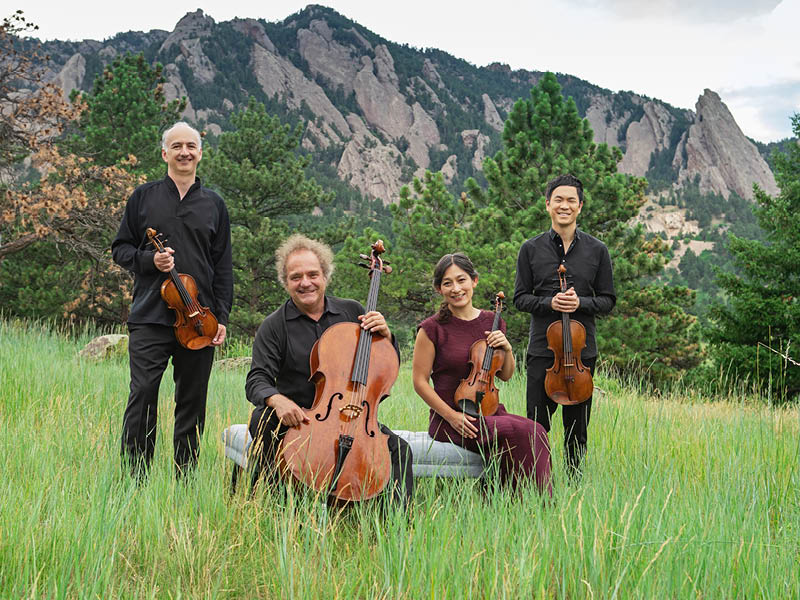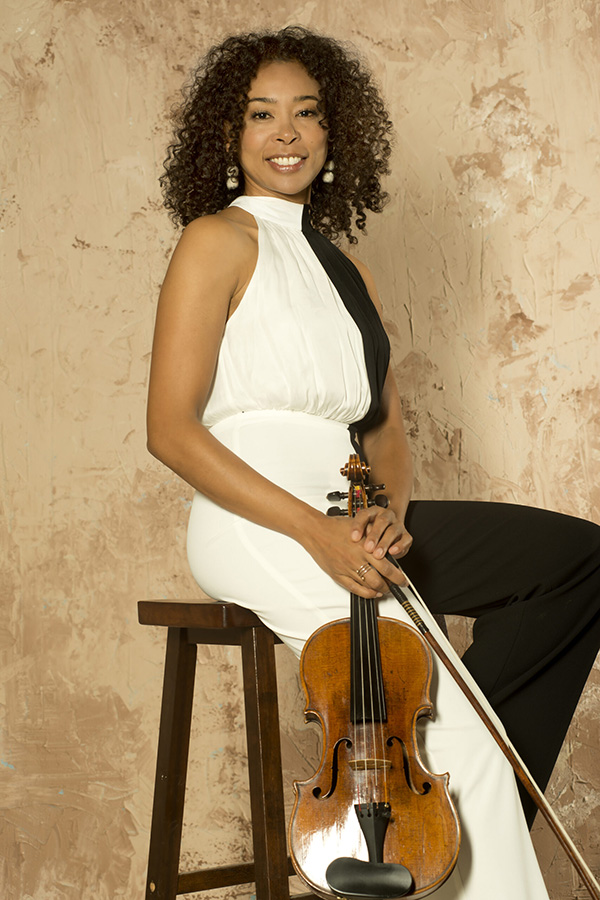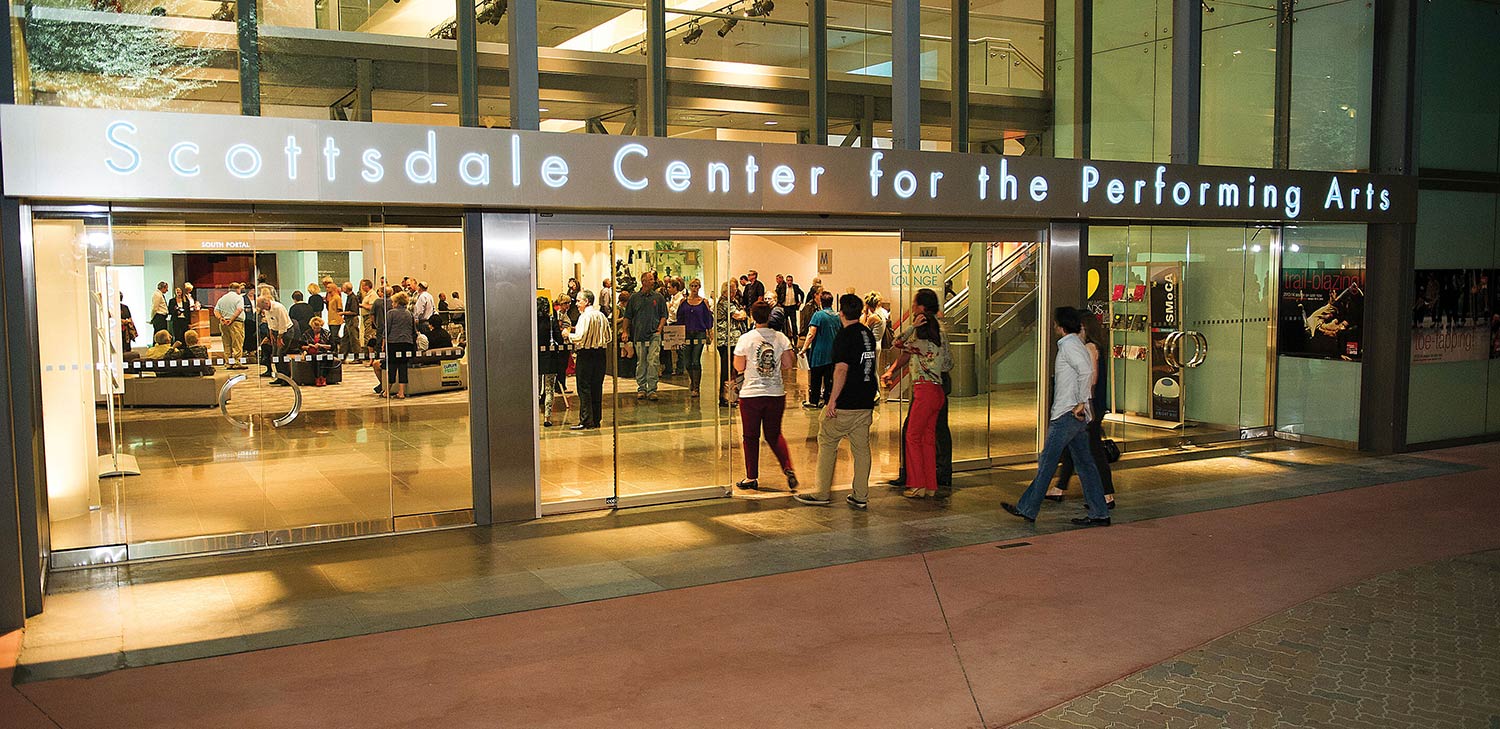A Conversation with
Arizona Composer Nokuthula Ngwenyama
and Takács Quartet Founder András Fejér

As the world-renowned Takács Quartet enters its 49th season, the ensemble is bringing a new work written for the quartet by Phoenix composer Nokuthula Ngwenyama to Scottsdale Center for the Performing Arts. The quartet will perform Ngwenyama’s Flow on Friday, March 22, bookended by Haydn’s String Quartet no. 63 in B Flat Major, op. 76 no. 4, “Sunrise,” and Beethoven’s String Quartet no. 8 in E Minor, op. 59, no. 2.
The following is a conversation with Ngwenyama and András Fejér, the quartet’s founding cellist. Brian Passey, senior communications manager for Scottsdale Arts, conducted the interview. Responses have been slightly edited for length.
Brian Passey: How did this collaboration begin? Did the quartet approach Nokuthula about writing for them? Or did Nokuthula present the work to the quartet?
Nokuthula Ngwenyama: I’ve known Harumi Rhodes [violin for the Takács] for many years. We played together in Marlboro [Vermont]. She actually gave me a call and asked whether or not I would consider writing a quartet for the Takács. Of course, it was shocking. It’s kind of scary to be asked to write a traditional string quartet. We know Beethoven sweated bullets over that! He had to write several string trios before he felt confident enough to write into the quartet medium. I asked if I could think about it for a little bit and figure out whether I had the fortitude—the musical and spiritual and emotional fortitude—to bring a piece worthy of the Takács quartet into the world for them. After much internal deliberation over a few days, I said, “Yes, of course I have to do this.” This is the most amazing opportunity and gift and encouragement anyone could ever have.
András Fejér: We’ve always trust Harumi and her judgment. She’s been a great proponent of contemporary music playing and commissioning. Whatever she suggests … who are we are we to contradict? Thula is great.
BP: András, how common is it for the quartet to debut new works written especially for you?
AF: In the past 45 years, we’ve been somewhat careful picking, mainly because we wanted to make sure we could record them eventually or the chamber music society societies who have been inviting the quartet would take them. There were some instances where that didn’t happen and, obviously, none of us were too happy about it. But, thank god, Thula is on another level, so we didn’t have such problems. Plus, many loyal chamber music societies where we’ve been playing in the past chipped in on the financing.
BP: Nokuthula, how often do you get opportunities like this? Is this rare, or is this fairly commonplace in the life of a modern composer?
NN: This is an incredible opportunity. And I’m so honored that the Takács Quartet asked me to do this. I think this type of a commission is definitely not an everyday occurrence, especially to be able to write for a quartet that is established, that has such a beautiful sound, that has this incredible reputation—and they’re incredible players. However, I can’t do the work for all the commissions I’m asked for. It’s a good kind of problem to have, and I want to write more and more, but raising a family and having two teenagers in the house requires a lot of bandwidth too. I’m very grateful to the community that has been encouraging my composition because I started out, at least professionally, in music, as a performer and as an instrumentalist. That was my first calling in the music world and then later began sharing my compositions. It’s just magical when we come together … to bring music into the world. It’s precious.
BP: András, what stands out to you in this piece as a musician? Is there something you particularly enjoy playing? Or is there anything uniquely challenging?
AF: I love the variation of modern contemporary and the stylized classical phrases and parts—what Thula interjects. It gives a nice fluid, organic whole, and I love that very much.
BP: Nokuthula, what inspired this piece? And what do you personally like about it?

NF: The core inspiration for the work, which is based on the natural world, per request, is trying to capture this initial energy outburst from the birth of our universe and where we are in it as the dust settles later on. That’s the core idea of the quartet. Going from those initial moments of everything to now, it’s kind of a big story. There’s a lot to pick and choose from, from the epic of reionization to hydrogen and helium to exploring those elements subatomically in a quark scherzo to pulling back out from the microcosm to the macrocosm and zooming back in and playing with that and our ideas of reality and then just coming to a joyful state of acceptance at the end that we’re all in this “flow.” We just have to accept it since it’s our natural state.
There’s a lot of humor in it, actually, because here we are being able to reflect on our natural state in the universe. That’s kind of a bizarre thing to be able to do, as a lifeform, in our universe. We know that our atomic matter is under seven percent of all known matter in our universe, so that makes us an anomaly, and that gives us an opportunity to cherish each other and cherish our atomic lives. I hope that people, when they listen to the piece, will find the joy in existence—will find that it’s actually kind of funny if we follow those patterns along—in terms of quark structure—and then to just enjoy the moment and just accept that this is what it is and to cherish one another as fellow super-minority atomic matter in our universe.
But I should also say that the natural beauty of Arizona really inspires my writing. I love looking at Camelback Mountain. In fact, I’ve written a duo for violin and viola called Sunrise Over Camelback. I’ve written a piece for solo viola and viola and orchestra, called Sonoran Storm, about one of our summer monsoons and haboobs. There is something so beautiful and magical about where we are in the Sonoran Desert. I appreciate the history. I appreciate the natural beauty. I think that’s really important, including land acknowledgment: Hohokam and Piipaash people who were here before, the canals that were constructed that are hundreds of years old. That history is in the land here, and if we’re sensitive to it as Arizonans and here in Maricopa County, it can be very inspiring.
BP: András, what are you looking forward to in regard to performing the work in the composer’s home community? Will the quartet approach this show differently than others because of that connection?
AF: It’s a supporting feeling to know that the audience’s attitude, right from the beginning, is already expectant, happy, and accepting. Usually when we perform a new piece, there’s an inherent hesitance in the audience, sort of a not-quite-open right away. That definitely will not happen here. They must love Thula, and hopefully the piece would have a more direct and immediate impact.
BP: Kind of similar question, but from your perspective, Nokuthula: having your piece performed here, in your community, by an internally known chamber music quartet, what are you looking forward to?
NN: I’m excited that so many people from the Phoenix Chamber Music Society, patrons and supporters, where I’m Composer in Residence, are excited to go. So many of them have come up to me and said, “We have our tickets already.” But I’m so sad to say that I will not be there. It is my children’s spring break, so, we had a long-ago scheduled trip.
I’m so excited that the Takács is coming to Scottsdale Center for the Performing Arts. I love your programming. I was there when the Emerson [String Quartet] played as well. I was there for Cécile McLorin Salvant; that was a magical evening. I love the programming that you do. It’s always great to know that you’re here in the Valley of the Sun.
BP: Nokuthula, though you’ll miss the local performance of Flow, you have previously heard the Takács perform it at other venues. What has that experience been like?
NN: They just keep diving even deeper into the material than I was when I wrote it. That’s why it’s alive, and it’s a collaboration. It doesn’t live unless it’s played and heard. Even the audience, when they come to a concert, they are collaborators because they are bringing their ears and their sensibilities to the performance, and it’s getting interpreted through that. So, they’re collaborating in that experience. It’s very much shared.
Flow is a co-commission from nine major U.S. concert series, including lead commissioner Cal Performances (University of California, Berkeley), Shriver Hall Concert Series (Baltimore), 92nd Street Y (New York City), University of Michigan, Friends of Chamber Music (Portland, Oregon), The Broad Stage (Santa Monica, California), Philadelphia Chamber Music Society, Celebrity Series of Boston, and Capital Region Classical (Albany, New York).
Takács Quartet is Edward Dusinberre (violin), Harumi Rhodes (violin), Richard O’Neill (viola), and András Fejér (cello).
Get your tickets to hear the Takács perform Flow alongside the Haydn and Beethoven works on March 22!
March 22 Performance Sponsors
World Class Partner

Presenting Sponsor

Back to Amplify home.
CONNECTIONS: Spark | Immerse | Inspire

